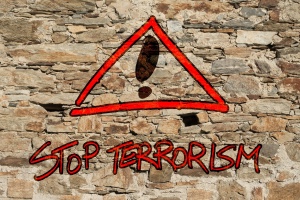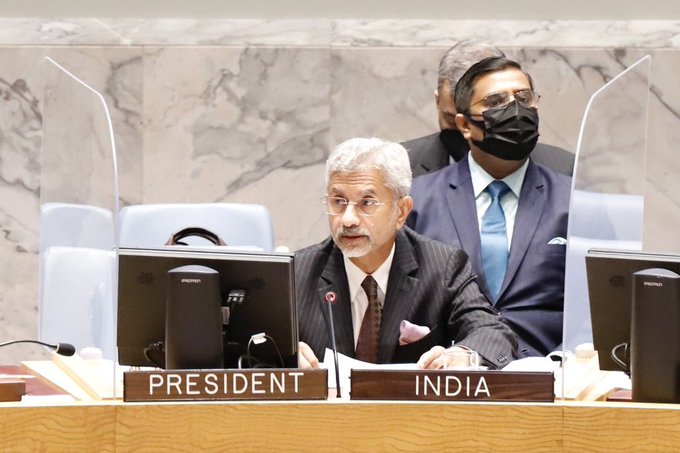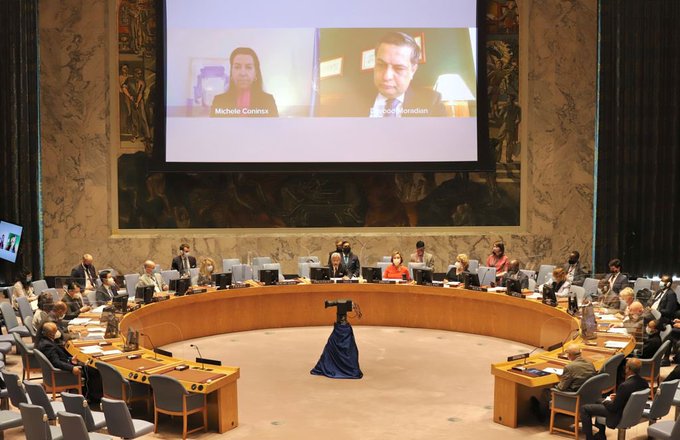
New York: Drawing an analogy between COVID-19 and terrorism, India has warned that what is true of Covid is even more true of terrorism: “none of us are safe until all of us are safe”. Resuming its function as the President of the United Nations Security Council last night (IST), India reiterated its full support for counter terrorism cooperation under the auspices of the UN.

“We must never countenance sanctuaries for terrorists or overlook the raising of their resources,” Indian External Affairs Minister Dr. S. Jaishankar, told the UNSC members while presiding over a briefing on ‘Threats to International Peace and Security caused by Terrorist Acts’ here on August 18, 2021. He added: “And when we see state hospitality being extended to those with innocents’ blood on their hands, we should never lack the courage to call out this double-speak.” While Jaishankar did not name any specific country, it may be recalled that China had hosted Taliban leaders in Tianjin on July 28-29, 2021.

Urging the Council members not to take “a selective, tactical or even a complacent view of the problems we face,” Jaishankar referred to terror outfit ISIL-Khorasan (ISIL-K), which has become “more energetic and is constantly seeking to expand its footprint” in India’s immediate neighbourhood. “This should be taken seriously. Events unfolding in Afghanistan have naturally enhanced global concerns about their implications for both regional and international security. The heightened activities of the proscribed Haqqani Network justifies this growing anxiety. Whether it is in Afghanistan or against India, groups like Lashkar-e-Toiba and Jaish-e-Mohammed continue to operate with both impunity and encouragement,” he said.
Insofar as ISIL is concerned, Jaishankar noted that its modus operandi had changed, with the core focusing on regaining ground in Syria and Iraq and affiliates functioning independently. “This evolving phenomenon is extremely dangerous and poses a new set of challenges to our collective efforts in our fight against ISIL and terrorism,” he warned.
In spite of the progress made to tighten the legal, security, financing and other frameworks to combat terrorism, he referred to the newer ways of motivating, resourcing and executing acts of terror, that terrorists were constantly finding .”Unfortunately, there are also some countries who seek to undermine or subvert our collective resolve to fight terrorism. That cannot be allowed to pass,” he stressed.
Referring to the latest 13th report of the UN Secretary General on the threat posed by ISIL (Da’esh) to international peace and security, Jaishankar said the Secretary General had provided “another stark reminder to all of us that ISIL (Da’esh) continues to pose a critical threat to international peace and security”. ISIL (Da’esh) remains active in Syria and Iraq and its affiliates are growing in strength, particularly as we heard from briefers, in Africa. The financial resource mobilization of ISIL (Da’esh) has become more robust. “The flow of funds has continued and rewards for killings I believe are now even being paid in Bitcoins! The radicalization of vulnerable youth by systematic online propaganda campaigns remains a serious concern,” he said.
At a time when the world will be commemorating the 4th International Day of Remembrance and Tribute to Victims of Terrorism on August 21, and will also be observing 20 years of the 9/11 tragedy in New York, Jaishankar said India too had more than its fair share of challenges and casualties.
He reminded of the 2008 Mumbai terror attack, the 2016 Pathankot air base attack and, the 2019 suicide bombing of policemen at Pulwama, and went on to express his solidarity with the victims and their families all over the world who have suffered, and continue to suffer, from the scourge of terrorism.
“We must never compromise with this evil,” he asserted. He mentioned that the international community holds a collective view that terrorism in all its forms and manifestations must be condemned. “There cannot be any exception or any justification for any act of terrorism, regardless of motivations behind such acts. We also recognize that the menace of terrorism cannot be and should not be associated with any religion, nationality, civilization or any ethnic group,” he said.
Jaishankar recalled that in January 2021, during his address at the Council, he had proposed an eight-point action plan for consideration. He reiterated some of its cardinal principles:
- Summon the political will: don’t justify terrorism, don’t glorify terrorists,
- No double standards. Terrorists are terrorists; distinctions are made only at our own peril,
- Don’t place blocks and holds on listing requests without any reason,
- Discourage exclusivist thinking and be on guard against new terminologies and false priorities,
- Enlist and delist objectively, not on political or religious considerations,
- Recognize the linkage to organized crime,
- Support and strengthen the FATF, and
- Provide greater funding to the UN Office of Counter Terrorism.
Jaishankar called on the Council to collectively build on these principles. “It is also important therefore to end the stalemate preventing the adoption of a Comprehensive Convention on International Terrorism, which India has championed for so long,” he said.
– global bihari bureau




